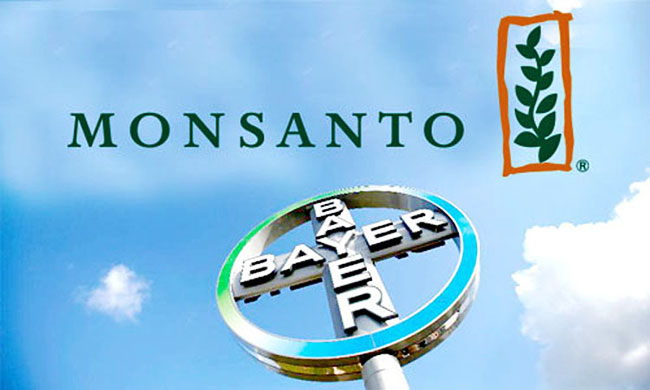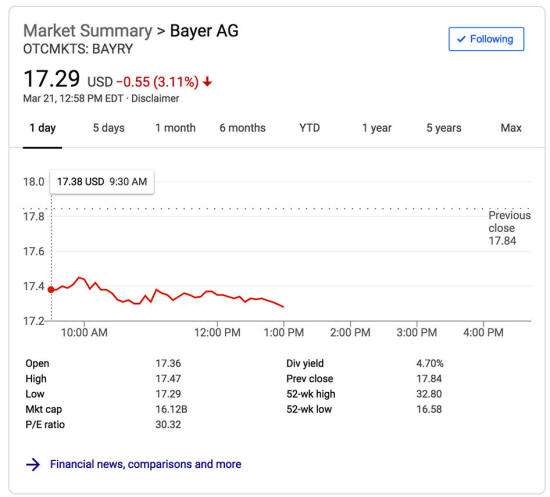|

by Sayer Ji
March 19, 2019
from
GreenMedInfo Website

In a poetic twist of fate, the very same day that the American
Health Association reversed decades old guidelines on using aspirin
to promote heart health and prevent strokes, advising against its
daily, low-dose use in healthy adults, Bayer's Monsanto buyout
headache transmogrified into a debilitating migraine...
A federal jury in San Francisco has found that
Monsanto's
weed-killer glyphosate was "a substantial factor" in causing a man's
cancer, delivering a major new blow to the agrochemical giant now
owned by Bayer who acquired it last year.
This is the second such verdict against Monsanto-Bayer within the
past five months, following the initial victory of Dwayne "Lee"
Johnson who was awarded 78.5 millions last October.
Neither verdict,
including 1,600 other pending cases in the US District Court for the
Northern District of California, bodes well for Bayer's hemorrhaging
stock value.
Last October, Ian Hilliker, an analyst at Jefferies LLC
in London, estimated in a note to clients that based on a class
action lawsuit involving 8,700 plaintiffs (at the time) believed to
have cancer as a result of glyphosate exposure, Monsanto's liability
could reach $800 billion dollars.
To put this in
perspective, the original Bayer-Monsanto buyout offer was $57
billion dollars.
Clearly, this no longer
looks like an "asset" to Bayer and its stockholders...
In
Tuesday's verdict, jurors unanimously determined that
Edwin
Hardeman, a 70-year old Sonoma County man, developed
non-Hodgkin's
lymphoma (NHL) as a result of his exposure to the herbicide glyphosate commonly marketed as
Roundup.
Hardeman testified that he
sprayed Roundup on his 56-acre property in Santa Rosa, CA, between
1986-2012, in order to control poison oak and weeds.
In 2015, he was
diagnosed with stage 3 NHL at the age of 66, and has undergone
conventional treatment.

The next phase of the case will look at whether Monsanto knowingly
concealed information about the potential harms of its product, and
whether damages will be awarded to Hardeman.
And the next case to go
to trial will be Pilliod vs. Monsanto, which is set to begin about
March 28 in state court in Oakland.
To date, Monsanto-Bayer now faces over 11,000 additional plaintiffs
who claim exposure to glyphosate-based products caused them harm.
Indeed, an increasingly
dense body of scientific research indicates
this weedkiller is a broad spectrum toxicant with dozens of modes of
toxicity.
With this latest verdict, the tides are clearly turning against
corporations who do not respect the precautionary principle and
therefore sacrifice both human and ecological health in the name of
prioritizing profit and gaining control of the marketplace
At the time of this writing (March 19th, at 9:30 pm EST), Bayer's
stock was at 19.67 per share. Once the news sinks in, we expect it
to decrease significantly.
[Update: On March 20th, Bayer's stock
crashed 9.6%. On March 21st, it sunk lower and is now at 17.29 a
share.]

|




